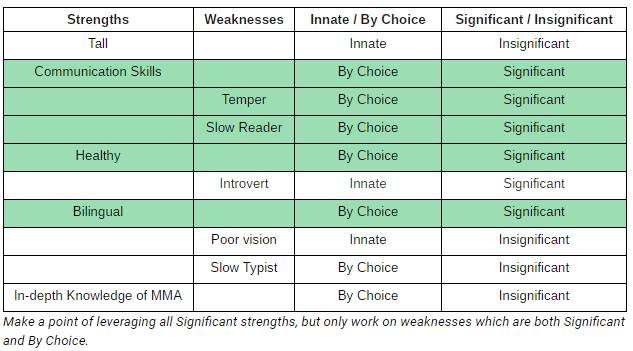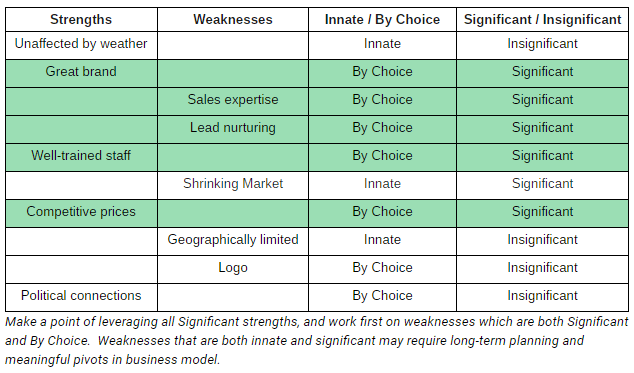The tendency to resent and eschew our weaknesses is detrimental to our success and an obstacle to happiness.
There is a gross flaw in the fundamental way our society seems to view weakness and imperfection. The fairy tale lives depicted in social media posts propagate and exacerbate the problem. Yet, its roots extend back far before the existence of the Internet. People have probably been hiding defects since prehistoric times when Yorg used a little Paleolithic soot from the fire to cover up one of his zits. However, human nature notwithstanding, the tendency to resent and eschew our weaknesses is detrimental to our success and an obstacle to happiness.
There is no small measure of subjectivity involved in assessing strengths and weaknesses. It all comes down to definitions. Our family, peers, and mass media perpetually bombard us with positive and negative feedback that defines that which is worthy of commendation or criticism. Not surprisingly, individuals appear to internalize such definitions with repeated exposure. It is imperative to learn to take things with a grain of salt; accept neither the praise nor condemnation as summarily justified. We may well be undeserving of much credit for those things for which we receive the most positive reinforcement and even have greater culpability for those things for which we are critiqued, or vice versa. Context is the key. An individual's physical attributes, intelligence, or propensity for athletics, for example, may be largely due to genetics, over which he has no control (epigenetics is another matter entirely). Conversely, his lack of success may be largely tied to specific choices he made and have little to do with those disadvantages, however valid, with which he's had to contend throughout life, such as a dysfunctional family, few financial resources, and bad luck. Moreover, it is often unclear as to whether weaknesses we identify are significant enough to warrant attention or should just be shrugged off.
Since we are all imperfect and have a variety of strengths and weaknesses, we should accept some things as innate constituents of what makes us the wonderful and unique individuals we are. One man's mar is another's prized asset. The world is a marvelous place due to this very diversity. Most people subconsciously leverage their strengths to assist in getting what they want throughout their lives. Maximum yield, however, may require more analysis. With this in mind, it is behooving to spend some time in introspection to assess and document our strengths and weaknesses, as the exercise can serve as a meaningful launching point for planning success strategies. When doing so, it is imperative that distinctions be made between those shortcomings that are outside of our control and impractical or impossible to correct and those which exist as the result of our choices.
Exercise:
Create a table with four column headings (Strengths, Weaknesses, Innate/By Choice, and Significant/Insignificant) into which, following some introspection and brainstorming, you can enter and classify your perceptions of those major characteristics that describe you. Conditionally format the rows to highlight those characteristics which are classified as both "By Choice" and "Significant". These, alongside the Significant Strengths, are the areas where you will want to focus your attention, apply some effort toward improvement, and maximally leverage. You can ignore the other Weaknesses, since they are beyond your control and/or insignificant. First, it is imperative to define the terms.
Definitions:
Strength - A characteristic I possess to a disproportionately high degree relative to others that generally produces desirable outcomes and returns (e.g. humor and wit). Or, a characteristic I possess to a disproportionately low degree relative to others that generally produces undesirable outcomes and returns (e.g. temper).
Weakness - A characteristic I possess to a disproportionately low degree relative to others that generally produces desirable outcomes and returns (e.g. humor and wit). Or, a characteristic I possess to a disproportionately high degree relative to others that generally produces undesirable outcomes and returns (e.g. temper).
Innate - Characteristic with which I was born or was acquired by means outside of my control.
By Choice - Characteristic developed or acquired as a consequence of my decisions, behavior, and habits, or lack thereof.
Significant - Characteristic that is universally correlated with being a good person or increasing an individual's odds of achieving success or happiness.
Insignificant - Characteristic that is not universally correlated with being a good person or increasing an individual's odds of achieving success or happiness.

Example:
I would describe myself as a "weak" reader. That is, I have never been an avid reader and, therefore, never developed the skill of being a focused and fast reader. This is a genuine liability to my success. Yet, I know it is merely a choice; I can choose to be someone who enjoys reading and derives all its associated benefits. It takes time and effort. The question is whether the investment of those resources is worth the return. If the introspective assessment leads to the conclusion that this is a Significant Weakness By Choice, I should work to eliminate it.
When grappling with the dilemma as whether to focus on improving a perceived weakness or leveraging an inherent strength, it is helpful to thoroughly evaluate the validity of the perception as well as the consequence of the weakness. Additionally, it is useful to seek input from a variety of trustworthy sources. By way of extreme example to amplify the point, someone suffering from pathological body dysmorphic disorder has a completely opposing and invalid perception of his imperfection when compared with that of his diagnosing physician (i.e. his body versus his psychological disease). Therefore, any attempts to correct the problem in the absence of clarity provided by alternative and, preferably, expert opinions will only make things worse.
It is also worth pointing out that many of those innate characteristics that we perceive as weaknesses or flaws can, in fact, be very endearing to those around us. People often appreciate our glitches and are attracted to the authenticity of those that are not afraid to show who they really are. Whether it's a squeaky voice, big ears, a goofy way of laughing, problems managing body weight, a grumpy temperament, an unusual cadence and way of speaking, a strange gait, or a strong accent, innate "defects" may engender affection from others - just ask Victoria Jackson, Will Smith, Eddie Murphy, Oprah Winfrey, Frank Costanza, Christopher Walken, John Wayne, and Arnold Schwarzenegger, respectively. It is comforting to know that we are not alone in our imperfections, while off-putting to witness those who feign immaculate existences. Bear in mind that strengths can manifest as weaknesses and vice versa based on the situation. Someone's ordinarily beneficent sense of humor and sharp wit may be injurious when used unrestrained in the sombre setting of a funeral or crisis. Or, one's introverted nature may prove a blessing during times when what is needed most is someone just to listen and say nothing.
Lastly, the underlying principles discussed herein can be applied at scale to a business. Scilicet, businesses, too, have strengths and weaknesses that should be identified and leveraged or mitigated, respectively. Business owners should be careful not to conflate their strengths with those of their business. Depending on how a business is managed, its core competencies may not align with those of its owners. It is wise to align individual's strengths with responsibilities within a company. Therefore, the aforesaid introspective exercise and documenting of a business' strengths and weaknesses, along with classification of whether these are innate or by choice and significant or insignificant should be conducted and analyzed. Unlike with individual's idiosyncrasies, customers do not find recurring business flaws very endearing or even tolerable. Reorganize or introduce additional resources as necessary to ensure all organizational weaknesses are mitigated before allowing them to impact the unique value proposition adversely. But, be sure only to do so within a culture that celebrates and leverages strengths. Never allow focus on improvement of weaknesses to dominate management's energy such that insufficient attention is given to those strengths which are primary competitive advantages and which could produce far greater results given the right leverage and nurturing strategy. A balanced dose of common sense and perspective is necessary in determining where resources are better allocated toward leveraging strengths or mitigating weaknesses. It is simply a matter of which produces better returns on investment. Most often, it will be focusing on leveraging strengths, especially when the weaknesses are not deal-breakers. Only once an organization has maximally leveraged its strengths to generate competitive advantages, should it reallocate attention and resources to the relentless elimination or mitigation of those weaknesses that lessen customer value. (Note: The fable, The Animal School, by George H Reavis, wonderfully illustrates the dangers of misplacing the emphasis from one's strengths to his weaknesses. It's definitely worth the quick read.)

How do you deal with weaknesses? What challenges did you encounter? Share your experiences and thoughts in the comment section below!
